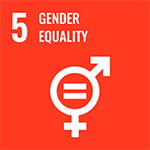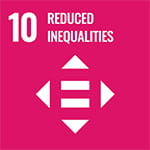Moving working-class students up the ladder
University students from working-class backgrounds stand a better chance of accessing academic and job opportunities, after UWE Bristol research exposed the inequities holding them back.
Ninety students across UWE Bristol and the University of Bristol contributed to the Paired Peers study, which compared the academic experiences of an equal number of working-class and middle-class students across multiple subjects between 2010 and 2013. Researchers also compared their employment trajectories after graduation, between 2014 and 2017.
Harriet Bradley, Professor of Gender and Employment at UWE Bristol, led a team including Dr Richard Waller, Professor of Education and Social Justice, which found socio-economic hindrances to be starkly evident.

Societal and cultural divisions
Working-class students were more likely to drop out of university, while those who did see their time through were still worse off than their middle-class counterparts, owing to fewer work placements and internships, and as a result, fewer graduate employment opportunities. Many such internships, which may lead to job offers, are unpaid, meaning working-class students could often not afford to take them up.
The barriers to participation were compounded by the prohibitive cost of clubs, societies and other cultural events and, frequently, the need to take paid employment to help fund their university studies.
After university
The disparities continued after university, with working-class students generally taking longer to settle into their careers and then on average earning less. Notably, working-class students from the University of Bristol benefitted from the institution’s reputational cachet, whereas some middle-class UWE Bristol students ended up in less prestigious jobs than they had anticipated. But the ‘search for graduate talent’ should not be confined to Russell Group universities like Bristol. These findings were particularly influential for the Bridge Group, an organisation that works with universities and employers to expand access to graduate opportunities.
Gender differences
The study also exposed sharp gender differences, with more women entering teaching, even though this was not what they had originally aspired to, a finding that directly impacted the Government Equalities Office report on Women’s Progression in the Workplace. Working-class women were the lowest average earners.
Policy changes and national impact
Following Professor Bradley’s advice, the University of Bristol introduced a number of new policies in 2015, including funded internships for students from under-represented groups, a fee waiver and bursary scheme, professional mentoring for undergraduates, and postgraduate bursaries for students from low-income families.
The research also prompted universities including Sheffield, Oxford Brookes and Buckinghamshire New to shift their strategic focus, with greater emphasis on Widening Participation activities, and more bursaries to support disadvantaged students.
At the national level, the Office for Fair Access changed its guidance to highlight the needs of students from different social groups. The Higher Education Funding Council for England similarly developed guidance to promote equality of opportunities. Supporting students to stay on at university and to progress into further study or work – a priority highlighted by Professor Bradley’s work – formed the crux of the 2014 National Strategy for Access and Student Success in Higher Education.
The Sutton Trust released a number of reports shaped by the findings from UWE Bristol, urging the UK Government to address the socio-economic disparities and provide greater financial support to low-income students. The work also informed recommendations from the government’s Social Mobility Commission, particularly around the ‘divided culture’ to be found amongst students from different social class backgrounds, and the need to enhance access to financial support for students from lower socio-economic groups.
Contribution to the UN 2030 sustainable development goals
UWE Bristol is proud to align our research to the UN sustainable development goals. The above research aligns with the following goals:
You may also be interested in

Research in the School of Education and Childhood
There is strength and diversity in the programme of educational research and evaluation at UWE Bristol. A broad range of substantive areas of enquiry is sponsored by a wide range of funding bodies.

Education and Childhood Research Group (ECRG)
Information about the Education and Childhood Research Group (ECRG) based at UWE Bristol.


